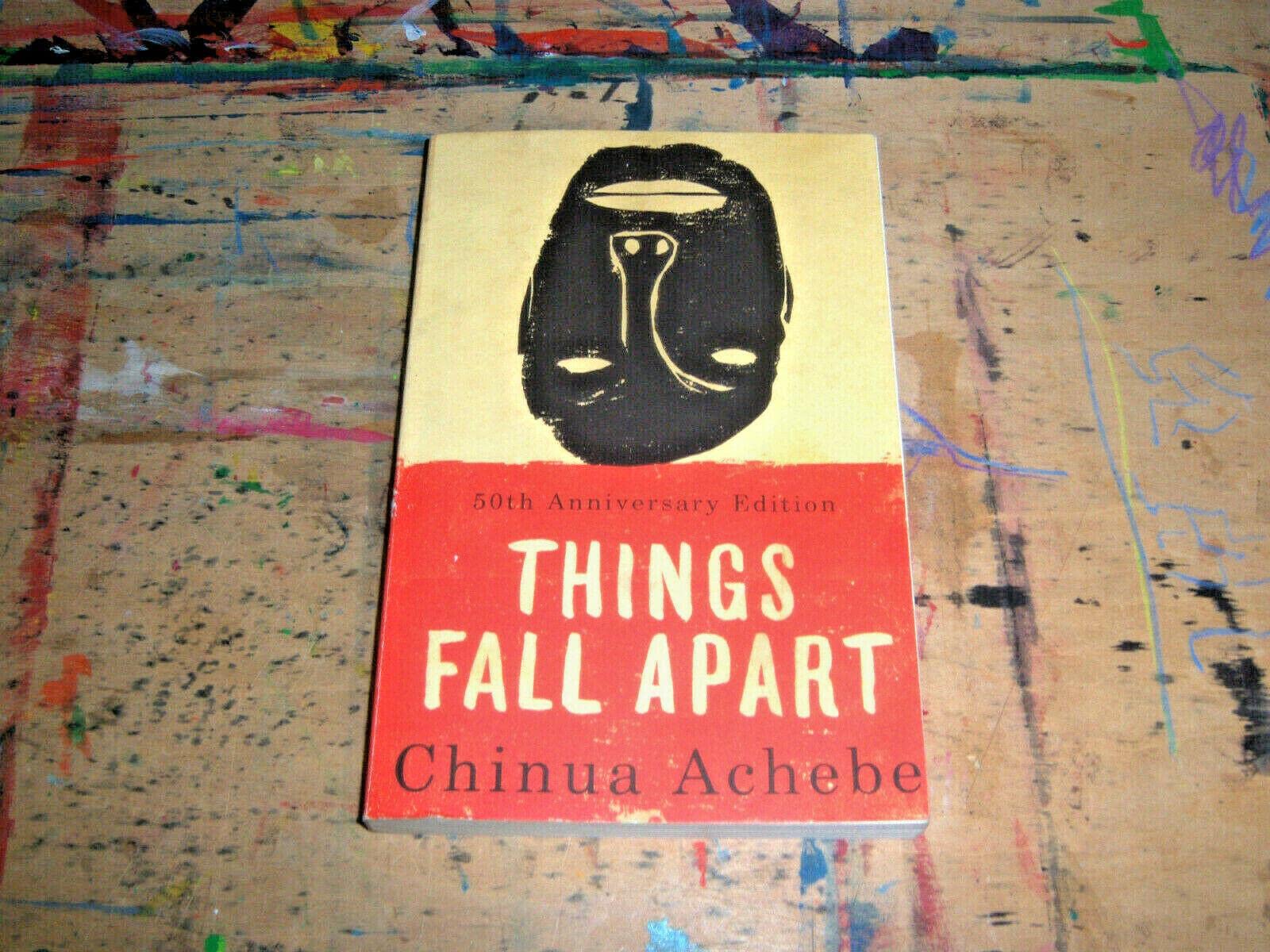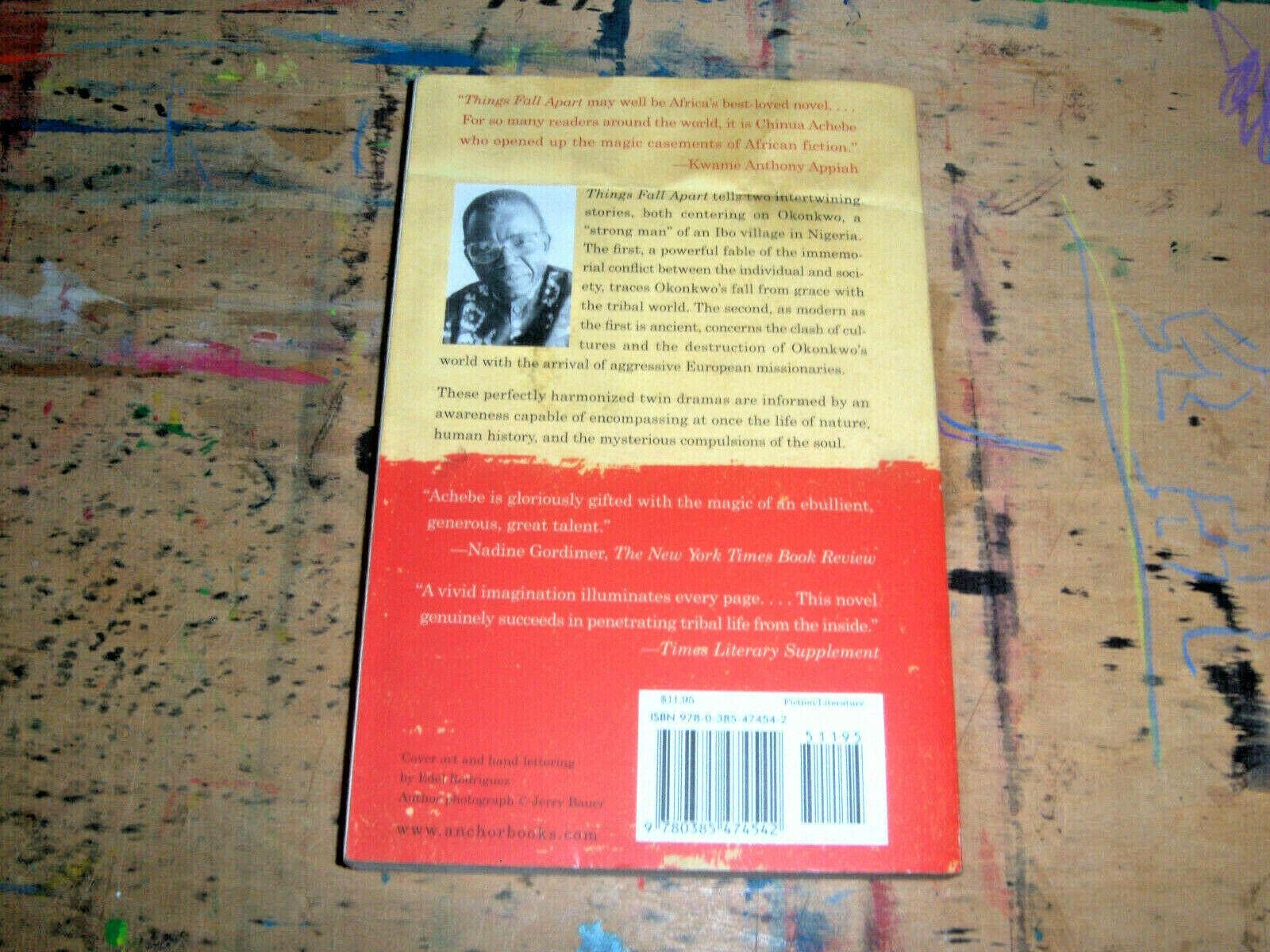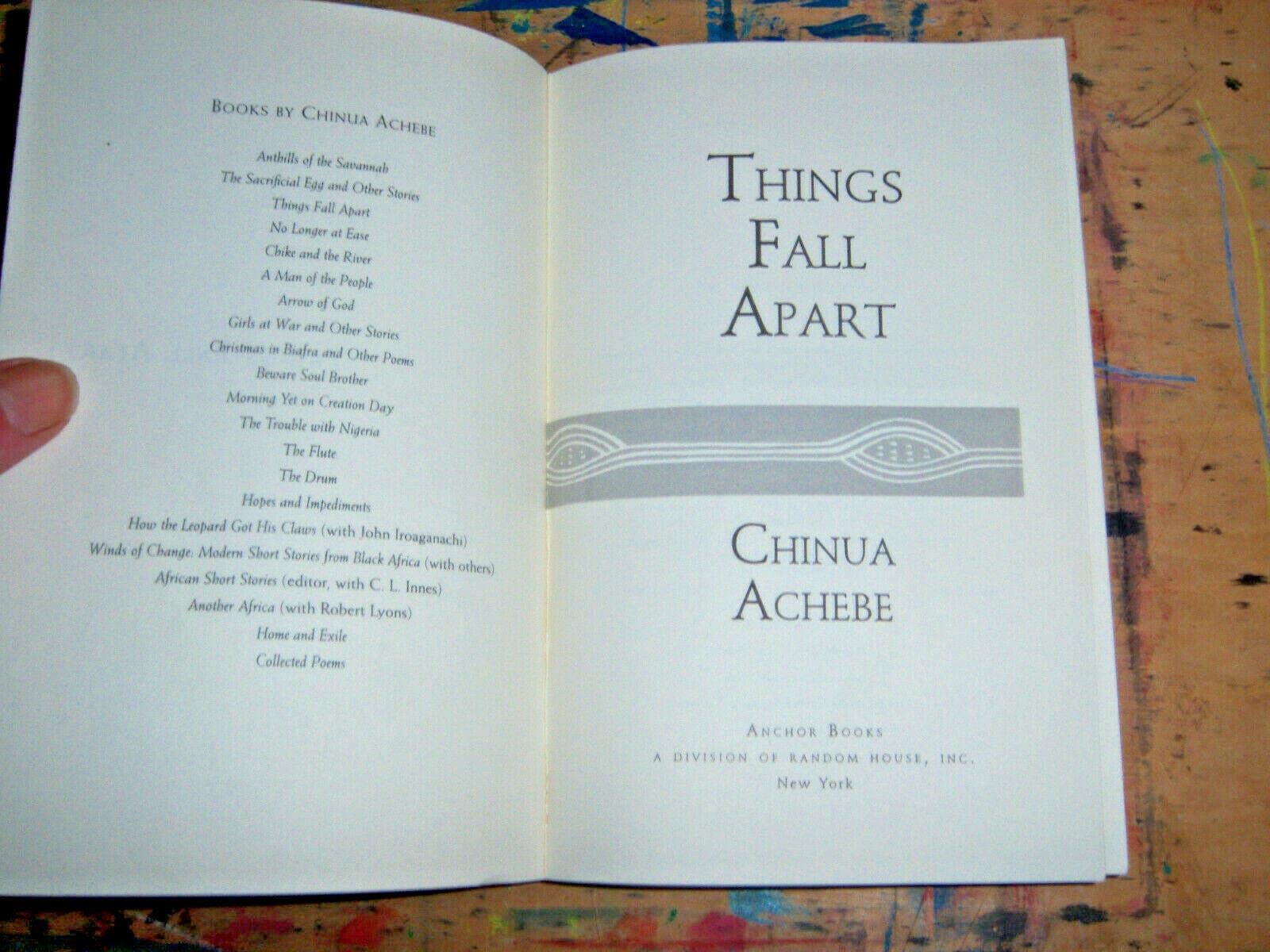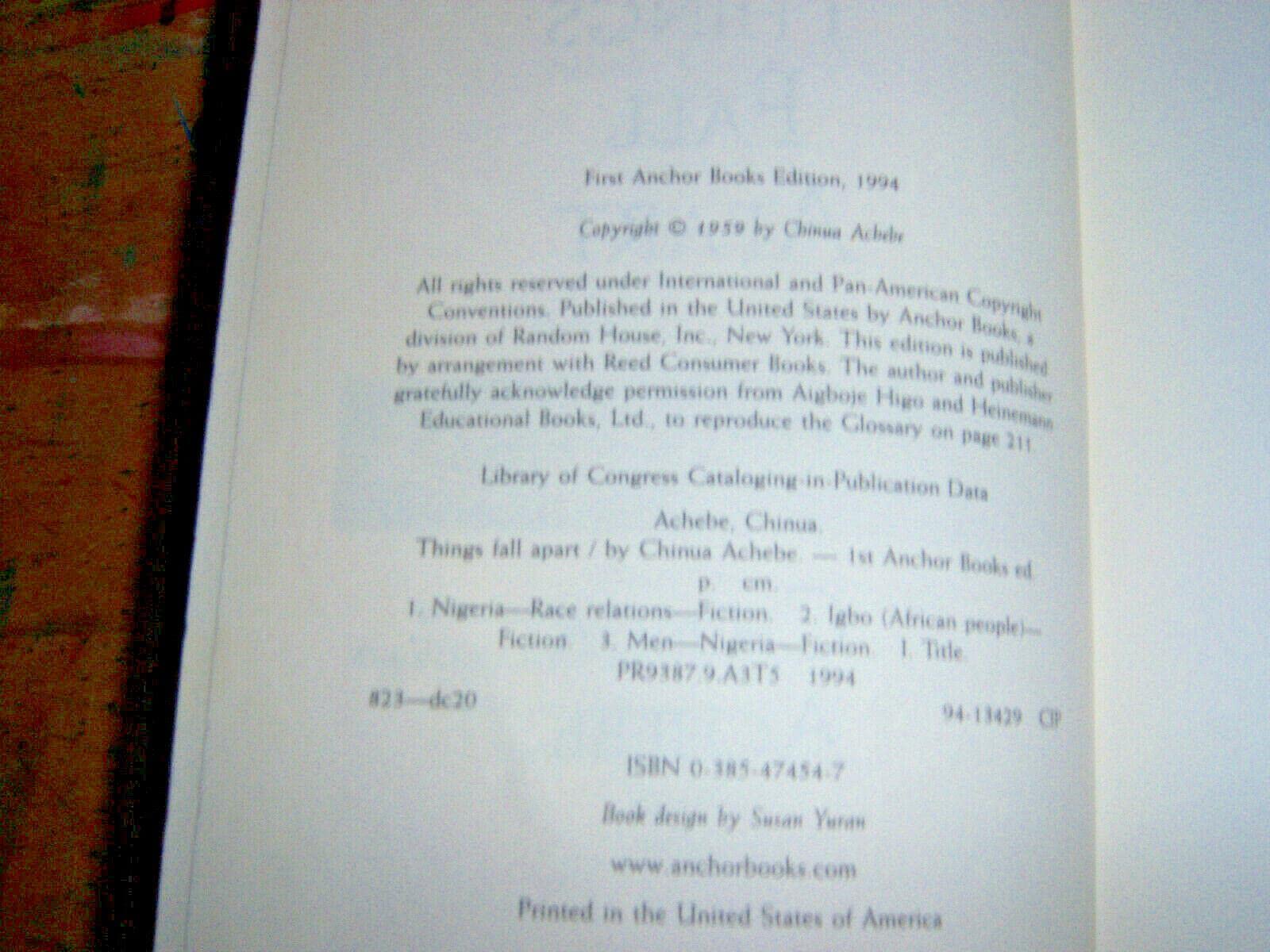معلومات عنا
دعم العملاء
احصل على التطبيق

قم بتوجيه الكاميرا لتنزيل التطبيق
حقوق الطبع والنشر © 2024 Desertcart Holdings Limited
![Things Fall Apart [Paperback] [1994] (Author) Chinua Achebe](https://m.media-amazon.com/images/I/71LUIkd5qcL.jpg)




Things Fall Apart [Paperback] [1994] (Author) Chinua Achebe
R**S
Fast delivery for a book
My son needed this book last minute for a college test. Fast delivery book was as described.
P**A
GreaT
Great
P**A
Three Stars
It was ok
J**E
Great book
A fantastic book, I kind of went to this vendor because I thought they had the same cover as what was advertised but all well, still a good book, just paid extra for nostalgia.
S**Y
Very informing
I’m glad to have bought it.
B**Y
Compelling
I have had my copy of Chinua Achebe for so long that I do not remember when I got it. I finally made time to read it. What a compelling read. Achebe gives readers an inside view of what life was like in a traditional African tribe from the the point of view of Okonkwo, a man with a fractured upbringing, which resulted in broken relationships with his multiple wives and children. With the intervention of English outsiders, bringing their religion and contrary views, the structure of the clan start to break down.This literary work should be required reading for all. The only thing that took me out of the story was that it was all told instead allowing readers to experience the tale.#CillasBookManiacs
P**F
Culture and Colonialism
This is a novel of conflict. Tradition and innovation, indigenous people and colonizer, fathers and sons, external appearance and internal angst, religion, culture, environment—everything seems to be at odds in this African novel telling the story of a vibrant culture and British colonialism. Chinua Achebe paints a dynamic, complex portrait of life in a traditional village. It is living, active, changing. This novel does not just offer a cliched story of the evil colonists destroying the beautiful culture of the natives. It shows a culture that is alive with its own strife, changes, and differing ideas. Within the tribe there are people who embrace the changes brought by missionaries and colonists, people who violently oppose them, and people who do something in between.The focus of the story is a man named Okonkwo. Achebe draws a nuanced, yet sharply defined character of a man driven to succeed, to be seen as strong, and to make a name for himself where his father failed to do so. “Whenever the thought of his father’s weakness and failure troubled him he expelled it by thinking about his own strength and success.” Intolerance for personal perceived failure is pervasive. Okonkwo distinguishes himself as a wrestler, creates wealth for himself, establishes a family whom he rules over as the head, and reacts violently against any perceived weakness or threat. He is a man wholeheartedly committed to maintaining his position and image of power while also bearing the internal, interpersonal, and societal conflict that such a rigid approach provokes. “Okonkwo ruled his household with a heavy hand. His wives, especially the youngest, lived in perpetual fear of his fiery temper, and so did his little children. Perhaps down in his heart Okonkwo was not a cruel man. But his whole life was dominated by fear, the fear of failure and of weakness. It was deeper and more intimate than the fear of evil and capricious gods and of magic, the fear of the forest, and the forces of nature, malevolent, red in tooth and claw. Okonkwo’s fear was greater than these. It was not external but lay deep within himself. It was the fear of himself, lest he should be found to resemble his father.”A matter-of-fact tone smooths over events that must cause internal tumult. When Okonkwo kills his adopted son with a machete to preserve his machismo and assuage the oracles, the only initial comment made about the emotional impact of this action is, “He was afraid of being thought weak.” In private, the event has a larger impact for Okonkwo. Both his character and culture are brought to life with these sorts of laconic, neutral descriptions. His private thoughts highlight this contrast of outward appearance and inward reality: “’When did you become a shivering old woman,’ Okonkwo asked himself, ‘you, who are known in all the nine villages for your valor in war? How can a man who has killed five men in battle fall to pieces because he has added a boy to their number? Okonkwo, you have become a woman indeed.’”This brings to light another key aspect of the culture: gender roles. Men are taunted and ostracized for being too much like a woman. A man must build his house, rule over his wives, defend his honor, lead his family, do his manly work. While emotion can still be expressed, it is bound by cultural mores. The book doesn’t seem to take a moral position on the treatment of women in the culture, but the gender dynamics are noticeably different than contemporary Western society. The focus of women’s role in the story is often as mothers (or women struggling to survive and have their children survive through the trauma of childbirth and the pitfalls of infancy) or wives (often beaten, subservient, primarily concerned with cooking food). The society does have structures in place to protect women and there are women in positions of power in the roles of oracle or religious figures.Okonkwo, after killing his adopted son to show strength, accidentally kills another man’s son and is banished from his tribe. He is forced to return to his mother’s family where he must rebuild his financial position and deal with the shame of banishment and his reliance on the female line of his family.The novel takes a major turn here as we are introduced to the creeping influence of colonialism and non-native religion. The culture has been described as animistic, polytheistic, and with a vibrant system of superstition and religious ritual. Many of the religious beliefs described seem to justify themselves by their long history of practice. One gets the sense that superstitions are in place because they have always been in place. Oracles ought to be obeyed because every person has been taught that there may be severe consequences for disobedience. Now, however, Okonkwo learns that Christian missionaries have begun efforts to convert his people and people in surrounding tribes. The reaction to this missionary presence is diverse. There’s a fair amount of confusion and jest toward silly beliefs. Some tribespeople, however, are quite receptive. As religion creeps in, we see a society in increasing conflict. This is not, however, a straightforward story of how idyllic native culture is corrupted by creeping colonialism. The missionaries are portrayed as a mixed bag; some have genuine motivations with some semblance of cultural sensitivity while others view the tribespeople as pagan barbarians to be rescued from their ignorant lives.Okonkwo finds himself, upon his return from exile, in an increasingly foreign homeland. Escalating conflict with the missionaries who trample unknowingly (at least at times) over important religious and cultural boundaries leads to conflict with the colonial government. This, one senses immediately, will only end poorly. The respect, honor, wealth, and power Okonkwo has worked so hard to build is swept away as essentially meaningless in the face of this new power. Okonkwo, however, is a man who will simply not accept imposed assimilation. He eventually beheads one of the government officials but receives no support from his tribe who back away from him in a symbolic gesture which highlights the impossible need to accept the impositions of outsiders for the sake of survival. Okonkwo, in a final act of control and defiance hangs himself, breaking one of the strong mores of his culture and leading to a heartbreaking coda for the story: “The Commissioner went away, taking three or four of the soldiers with him. In the many years in which he had toiled to bring civilization to different parts of Africa he had learned a number of things. One of them was that a District Commissioner must never attend to such undignified details as cutting a hanged man from the tree. Such attention would give the natives a poor opinion of him. In the book which he planned to write he would stress that point. As he walked back to the court he thought about that book. Every day brought him some new material. The story of this man who had killed a messenger and hanged himself would make an interesting reading. One could almost write a whole chapter on him. Perhaps not a whole chapter but a reasonable paragraph, at any rate. There was so much else to include, and one must be firm in cutting out details. He had already chosen the title of the book, after much thought: The Pacification of the Primitive Tribes of the Lower Niger.”Episodic snapshots of a life, a community, and culture slowly transition into a complicated story of death, colonialism, and discord. Clashes of cultures and personalities and religion and family and personal demons are drawn beautifully and with deceptive depth in Achebe’s prose. It’s an easy-to-read—though not pleasant to read—text that could be read again and again revealing new insights each time. It’s a study in imperfection at all levels and a story that feels real, alive, and vital. The tone of the novel is haunting. It remains dispassionate and neutral when the events scream for emotional response. Achebe has achieved something important and beautiful with this enduring, essential text.A
A**T
Things Fall Apart
Excellent reading
A**I
È arrivato prima del tempo specificato
Ho ordinato per mia figlia quindi non saprei com’è
K**K
Worthy
I like it
ترست بايلوت
منذ شهر
منذ شهرين